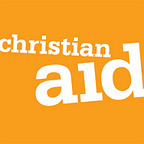2016 was a dark year for South Sudan: what hope can Christian Aid’s partners bring in 2017?
Three years after South Sudan’s civil war began, Christian Aid and its local partners have a unique role to play pursuing peace and sustainable development, says our senior advocacy and policy officer for East Africa, Natalia Chan.
Globally, 2016 has been a year of overwhelming political, cultural and social challenges worldwide. But for the people of South Sudan, 2016 has signified a particularly low point of despair and suffering.
This time last year, South Sudanese people held a glimmer of hope through a peace deal signed in August 2015. But this deal failed to bring peace and the promised ceasefire was not implemented. In the months that followed, tensions rose once again, as conflict spread to previously unaffected areas of the country.
In July 2016 — the eve of South Sudan’s fifth birthday — the situation erupted when intense conflict broke out in Juba between the government and opposition soldiers. It culminated in street battles reminiscent of December 2013 (when the civil war began) and the killing and displacement of yet more civilians.
It signalled the return of war, the growing fragmentation of the conflict and a devastating loss of hope. Perhaps most terrifying has been the increasing ethnic division and hate speech both inside the country, and from the South Sudanese diaspora outside it.
The future for South Sudan
The prospects for 2017 are extremely grim: the humanitarian situation has deteriorated significantly. As of December 2016, 1.87 million of the 11.6 million population are internally displaced from their homes inside South Sudan. A further 1.15 million are refugees in neighbouring countries.
An estimated 4.8 million are facing severe food shortages, and this is likely to worsen next year. Cholera, measles, guinea worm and kala azar, the deadly tropical disease, are rife. There are nearly 1.9 million malaria cases.
South Sudan is now one of the most dangerous places to be an aid worker, and getting humanitarian assistance to those who need it most has become increasingly difficult.
Meanwhile, food prices have sky-rocketed due to hyper inflation (in October, the inflation rate was nearly 836%, the highest in the world). People are struggling to feed their families as the local currency has deteriorated, salaries have gone unpaid, and opportunities to earn an income have dwindled.
Human rights atrocities continue to mount, with severe attacks against civilians including sexual violence. The impact of trauma is inescapable and long-lasting.
In the face of such a devastating year, what hope is there for South Sudan? The hope comes from within South Sudan: the agency and tenacity of its people cannot be underestimated.
How we’re helping
But what can an organisation like Christian Aid do as South Sudan enters its fourth year of civil war?
We have walked with the people of South Sudan for decades. As humanitarian space becomes increasingly fraught, we still believe we have a unique role to play.
We are passionately committed to partnering with local and national bodies. This is a true partnership based on shared values, support and mutual learning, not a sub-contractual relationship.
Our partners understand South Sudan and have years of experience. They bring help to the hardest to reach areas, and stay with communities when all others leave. Long-term, they are the ones with the skills, understanding and energy to help South Sudanese people survive difficult days.
This partnership approach has enabled us to respond to the needs of conflict-hit communities and people living in remote areas — whether by distributing food or essential items, providing safe water or strengthening sanitation and hygiene.
Amid this emergency response, long-term needs cannot be forgotten. As foreign interventions have failed, it has become increasingly clear that only the South Sudanese people can lead the drive towards lasting peace.
In darkest times, the churches in South Sudan have shone a light. For instance, our partner the South Sudan Council of Churches (SSCC) is enacting an Action Plan for Peace, advocating for peaceful negotiation, dialogue within neutral forums and reconciliation from the grassroots.
Just last month, South Sudan’s most prominent church leaders (including SSCC representatives) travelled to London to visit Archbishop Justin Welby, following a meeting with Pope Francis in the Vatican. All parties committed to do all they could to promote peace and reconciliation.
We remain strongly committed to supporting the churches’ work, including the Action Plan for Peace. Elsewhere, our other partners continue working closely with communities to tackle local-level conflict and train local peacebuilders. This includes using theatre and film to create spaces for dialogue on conflict issues.
After decades of conflict, another generation cannot be lost to war. While most international donors focus on humanitarian response, education has suffered. South Sudan has the world’s second highest proportion of children out of primary school.
Despite funding constraints, we continue to support three partners to increase access to education. We have a special focus on girl’s education, in contexts where only one girl in 10 completes primary education, and very few of those continue to secondary school.
We have also worked with another partner to improve access to emergency reproductive health services for internally displaced people and host communities.
While all this is helping to bring about change, South Sudan will need our continued support for months and years to come. As hopeless as the situation may seem, informed and compassionate international engagement must not stop.
In the words of South Sudanese church leader, Bishop Isaiah Dau:
‘I believe the message of Christmas inspires us that there will be another day, there will be life again, all will not always be war and gloom. I believe with the work of… the people of good will, locally and internationally, peace will come to South Sudan.’
